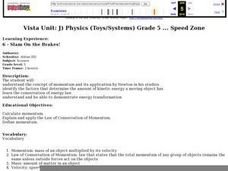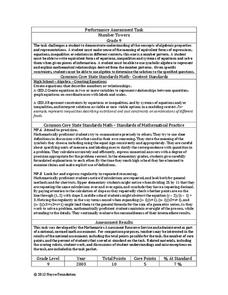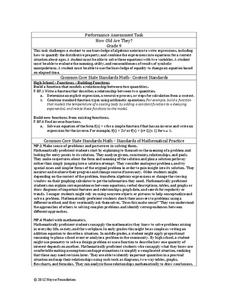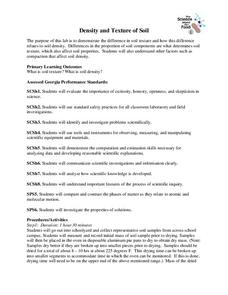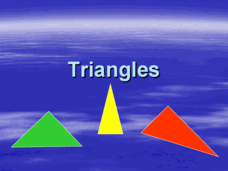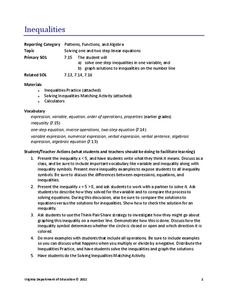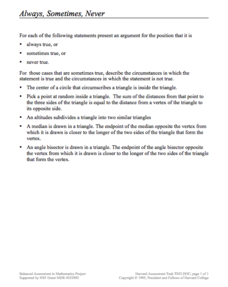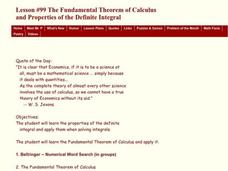EngageNY
How Do Dilations Map Angles?
The key to understanding is making connections. Scholars explore angle dilations using properties of parallel lines. At completion, pupils prove that angles of a dilation preserve their original measure.
Curated OER
Slam On the Brakes!
Fifth graders study the concept of momentum and its application by Newton in his studies. They view a demonstration and complete an experiment with toy cars on a racetrack that shows them the properties of momentum and how velocity and...
EngageNY
The Angle-Angle (AA) Criterion for Two Triangles to Be Similar
What do you need to prove triangles are similar? Learners answer this question through a construction exploration. Once they establish the criteria, they use the congruence and proportionality properties of similar objects to find...
Inside Mathematics
Number Towers
Number towers use addition or multiplication to ensure each level is equal. While this is common in factoring, it is often not used with algebraic equations. Solving these six questions relies on problem solving skills and being able to...
Science Geek
Ionic Bonding
Here's a presentation that answers the age-old question of the covalent bond to the ionic bond, "Why won't you share?" Included is information about covalent and ionic bonds, the octet rule, ionic compounds, cations versus anions, and...
EngageNY
Base Angles of Isosceles Triangles
Build confidence in proofs by proving a known property. Pupils explore two approaches to proving base angles of isosceles triangles are congruent: transformations and SAS. They then apply their understanding of the proof to more complex...
Inside Mathematics
How Old Are They?
Here is a (great) lesson on using parentheses! The task requires the expression of ages using algebraic expressions, including the distributive property. Pupils use their expressions to determine the individual ages.
EngageNY
Solving Equations with Radicals
Show learners how to develop a procedure for solving equations using radicals with the fifth lesson plan of the 25-part module that challenges learners to use properties to solve multi-step quadratic and cubic equations. Individuals...
University of Georgia
Density and Texture of Soil
All soil is not created equal! A lab activity asks learners to collect and analyze soil. Specific calculations determine the amount of sand, silt, and clay in a sample and allow individuals to identify the soil texture.
Curated OER
Lab Activity: Model of the Planets
This instructional activity leads the class through the calculations needed to construct circles to represent the planets of our Solar System. The actual values are provided, as are suggested calculations to create the scale diameters. ...
Curated OER
States of Matter
Properties in measurement, pressure and viscosity of solids, liquids, and gases are the main topics covered in this slideshow. The explanations of Pascal's, Bernoulli's, and the Venturi effects are very clear. Easy to understand diagrams...
Curated OER
Isosceles Triangles
In need of a fun way to define an isosceles triangle? This activity has learners fold a paper in half and then cut it to create an isosceles triangle. They determine the line of symmetry by folding the triangle in half and then use the...
Virginia Department of Education
Inequalities
Not all resources are created equal — and your class benefits! Scholars learn how to solve one-step inequalities using inverse operations. They complete an activity matching inequalities to their solutions.
Concord Consortium
Always, Sometimes, Never
Do your learners always, sometimes, or never remember the properties of the segments in triangles? Get that number closer to always with a creative lesson analyzing all four segments. Scholars consider a statement about one of the...
LABScI
Viscosity: The Fluid Lab
There's more to fluids than meet the eye—they include gases, liquids, and polymers, too! Scholars complete three hands-on activities exploring different properties of fluids. They explore viscosity by measuring the resistance, or...
Curated OER
Compatible numbers to 20
Students practice theories dealing with equals sign used as a balance, inequality symbols and practice utilizing a box or some other geometric shape to represent an unknown number. They assess numeracy problems embedded in language-rick...
Curated OER
Solving Equations
In this solving equations worksheet, learners solve and complete 12 different problems that include solving various equations by addition or subtraction. First, they identify and define the difference between using the addition property...
Curated OER
Equations With Radical Expressions
Students solve systems of equations with radical expressions. After reading real life situation, they translate the problem into algebraic expressions. As a class, students solve quadratic equations and inequalities by graphing and...
Curated OER
Theory of Polynomials
In this theory of polynomials worksheet, students use the discriminant to determine whether the zeros are real and equal, real and unequal or complex. They find the values of the roots. This two-page worksheet contains 16 problems. ...
Curated OER
Quadrate Lab
Young scholars investigate tree stems and conduct an experiment on how non living factors affect living factors. In this tree stems lesson plan, students observe and record physical characteristics, and make predictions on what factors...
Curated OER
The Fundamental Theorem of Calculus and Properties of the Definite Integral
Students discuss the importance of fundamental theorems in math. In this calculus lesson, students define the fundamental theorem of calculus and discuss why it is so important they understand it. They work problems to model how this...
Curated OER
Properties of Logarithms
In this logarithm worksheet, students describe the steps in solving logarithm problems. They determine the value of given logarithms and justify their answers. This three-page worksheet contains 7 problems. ...
Curated OER
Multiplying Polynomials using the Distributive property.
Students factor polynomial functions. In this algebra lesson, students solve problems through factoring and distribution of the negative sign correctly.
Curated OER
Volume Lab
How can we find volume if it a shape isn't easy to measure? Investigate methods for determining this as the volume of regular and irregular objects is explored in several stations. Learners discover that when the standard formula for...

